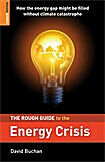Posted in Comment, Repowering communities on 10/28/2010 11:19 am by Stephen Tindale
This week, I was taken on a tour of properties owned by Islington Council. Islington is an area of London with many council home. The borough council was run by the Liberal Democrats until May 2010. However, in the local elections, it reverted to Labour control – it has been run by Labour for most of the last few decades. The Liberal Democrat leader, Terry Stacy, was personally very committed to action on climate and fuel poverty, and the new Labour leader, Catherine West, appears to be the same.
read more »
Posted in Answers to your questions, Technology on 10/25/2010 03:43 pm by Administrator

Question: Just curious, but how expensive is a widespread district heating network for, say, 100,000 inhabitants?
Alessandro De Mida
read more »
Posted in Comment on 10/22/2010 08:52 am by Stephen Tindale
The UK government has cut spending on climate schemes less than it has cut most other schemes. But is has cut local government grants by more than a quarter, so local government must play a greater role on energy efficiency schemes. In addition, the government should have made winter fuel payments means-tested.
read more »
Posted in Comment on 10/19/2010 07:45 pm by Stephen Tindale
Yesterday, I spoke at a conference in London on thorium nuclear energy and molten salt reactors. Generally, my view is that nuclear is a necessary, low-carbon bridge technology, but that, to keep costs down, the same designs should be used, as the French have done, rather than each new reactor being an ‘innovation’, which is the UK approach.
However, thorium could be a valid exception to this.
read more »
Posted in Books, Policy on 10/18/2010 06:03 pm by

The European Union cannot be accused of failing to see the big picture on climate change. The only problem, and it is major, is that Europe lacks followers of its lead. However, for years, EU policy on energy – responsible for around two-thirds of all greenhouse gases – has seemed remarkably narrow. It has focused almost exclusively on networks and, among networks, almost exclusively on electricity and gas.
In his new book, ‘The Rough Guide to the Energy Crisis’, David Buchan outlines the ways forward.
read more »
Posted in Policy on 10/13/2010 01:24 pm by Stephen Tindale

The EU should strengthen its CHP directive so that, whenever anything is burnt to generate electricity, the heat must be used. It should also require member states to do as the Swedes do and require energy efficiency improvements whenever a property is sold or rented out.
read more »
Posted in Comment on 10/12/2010 02:07 pm by Stephen Tindale
The South African government has published an energy plan which proposes a decline in the use of coal and six new nuclear power stations. The country is not short of coal, so the government should be commended for exploring alternatives.
read more »
Posted in Comment on 10/08/2010 08:55 am by Stephen Tindale
It isn’t often worth commenting on the fact that an agreement has been signed. Too many politicians make too many promises about what they plan to do in the future. However, a co-operation agreement between the US, the world’s top polluter, and Iceland, the world leader on geothermal energy use, is an exception.
read more »
Posted in Comment on 10/04/2010 10:25 am by Stephen Tindale
Last week, I attended a European Commission conference on the future of energy policy. Energy Commissioner Oettinger delivered a worthy though unsurprising speech, but did at least stress energy efficiency – “vast untapped potential” – and said that this was his first priority.
read more »
Posted in National and regional statistics on 10/03/2010 03:59 pm by Stephen Tindale

This document sets out some of the important climate change statistics concerning energy use in Hungary.
read more »






